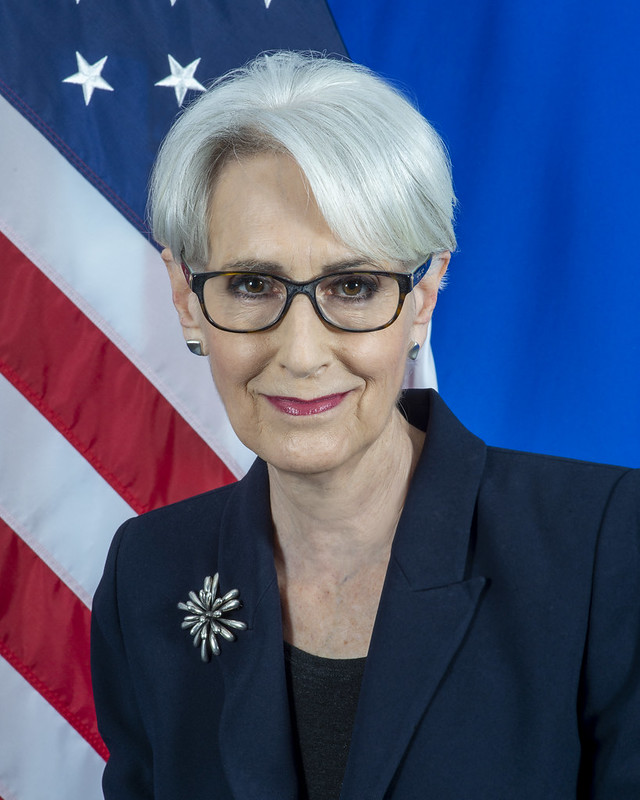On July 26, U.S. Deputy Secretary of State, Wendy Sherman, met with Chinese Vice Foreign Minister, Xie Feng. During their meeting, Sherman, the highest-ranking Biden official to have visited China, was bombarded with accusations; Xie termed U.S. policy towards China “deeply misguided.” The communist regime also delivered Washington up a list of “wrongdoings” that have to be ended for the bilateral relationship to become ‘stable’.
The list of the Chinese Government’s demands includes the U.S. undoing all the recent sanctions around members of the Party by (a) withdrawing visa restrictions on CCP members and their families, (b) ending actions against Chinese businesses, students, media outlets, and educational institutions, (c) ending sanctions on Chinese officials, leaders, and government departments, (d) withdrawing the extradition request for Huawei executive Meng Wanzhou, who is currently detained in Canada, and (e) ending visa restrictions imposed on Chinese students.
During the meeting, Xie accused Washington of attempting to “contain China” and of trying to use policies of “competition, cooperation, and confrontation” as cover-ups for putting pressure on China. He stated that Washington was “demonizing” his country with an outlook of seeing China as an “imagined enemy.” The minister also went on to say that America was practicing “coercive diplomacy” and that China has “never coerced any country.”
“When the U.S. needs China, cooperation is required; in areas where China has advantages, they cut off supply chains and impose sanctions… To settle whatever the U.S. wants to settle, and to get whatever the U.S. intends to have, it has been seeking unilateral benefits all along. How can there be such a rule where one does all the bad deeds but takes all the benefits?” Xie said at the meeting.
With regard to human rights issues, Xie insisted that the United States should handle its own problems first before pointing fingers at other nations. During the meeting, Sherman had raised a host of issues like the anti-democratic crackdown in Hong Kong, the genocide against Xinjiang, restricting freedom of the press, abuses in Tibet, conduct in the Taiwan Strait and the South China Sea, and conduct in cyberspace.
Success
You are now signed up for our newsletter
Success
Check your email to complete sign up
“There are some things that rise above specific differences that are the global responsibility of great powers… We do expect … them to understand that human rights are not just an internal matter, they are a global commitment which they have signed up for” Sherman said in an interview with the Associated Press.
In addition to human rights, Sharman raised concerns about Beijing’s unwillingness to allow the World Health Organization (WHO) to conduct a second investigation into the origin of COVID-19. She also raised several other issues like counternarcotics, climate change, the situation in Afghanistan, and so on.
Flawed ‘meeting’ policy?
Before Sherman’s visit to China, the Biden administration had indicated that the trip would be a continuation of the talks that both nations held at Anchorage, Alaska, back in March. During the Alaska talks, U.S. National Security Advisor Jake Sullivan and Secretary of State, Antony Blinken, had met with Chinese foreign policy diplomat, Yang Jiechi, and Foreign Minister, Wang Yi. The State Department spokesman Ned Price indicated on July 21, that Sherman’s visit to China was “from a position of strength.” Price said, “I think broadly speaking, the deputy intends for this engagement to show and to demonstrate to the PRC what responsible and healthy competition can look like.”
The Chinese side went on the offensive against America, with Yang calling it a “struggling democracy,” criticizing Washington’s trade policy, and accusing the U.S. of “poor treatment of minorities.”
“We believe that it is important for the United States to change its own image and to stop advancing its own democracy in the rest of the world,” Yang stated. The Chinese side also violated the meeting’s protocol by talking excessively even though there was a strict time limit. The diplomats were given two minutes to talk in their opening statement. But Yang spoke for over 15 minutes.
This deliberate snub will likely be used by the Chinese Communist Party propaganda media to show that the U.S. side is weak and has to lose “face,” while the Chinese government is “strong.”
A Biden administration official stated that the Chinese delegation seemed to have arrived “intent on grandstanding, focused on public theatrics and dramatics over substance.”
In an interview with the American Thought Leaders program, Miles Yu, a Chinese-born advisor to former Secretary of State Mike Pompeo, had warned that the Chinese delegation had only come to Alaska to “discredit American democracy” and score a “cheap shot.”
In a write-up at The Epoch Times, China expert Gordon Chang questioned the Biden administration for continuing to talk with Beijing even after the Alaska talks ended up in a mess.
Chang blames Washington for its naïve view of China. He states that Sullivan and Blinken should have sent the Chinese delegation “packing” as soon as they “went on a bender for the benefit of the cameras.”
Chang warned that China is in no mood for substantive discussion and that Washington’s incessant pursuit of Beijing makes America an easy target for the communist party.
“Chinese leaders of the communist variety often talk of ‘friendship’ but are ruthlessly pragmatic, and often just ruthless. For them, personal feelings have no value in relations with other states. Personal diplomacy with Beijing is counterproductive: Americans chase after the Chinese and the Chinese take advantage of this eagerness,” Chang wrote.
According to “Trading Nations”, part of CNBC news, analysts’ comments on the trip included Stephen S. Roach, Yale Senior Fellow and formerly chairman of Morgan Stanley Asia and chief economist at Morgan Stanley, the New York-based investment bank, who believes that China’s targeting of U.S. businesses signals the “early stages of a cold war.”















